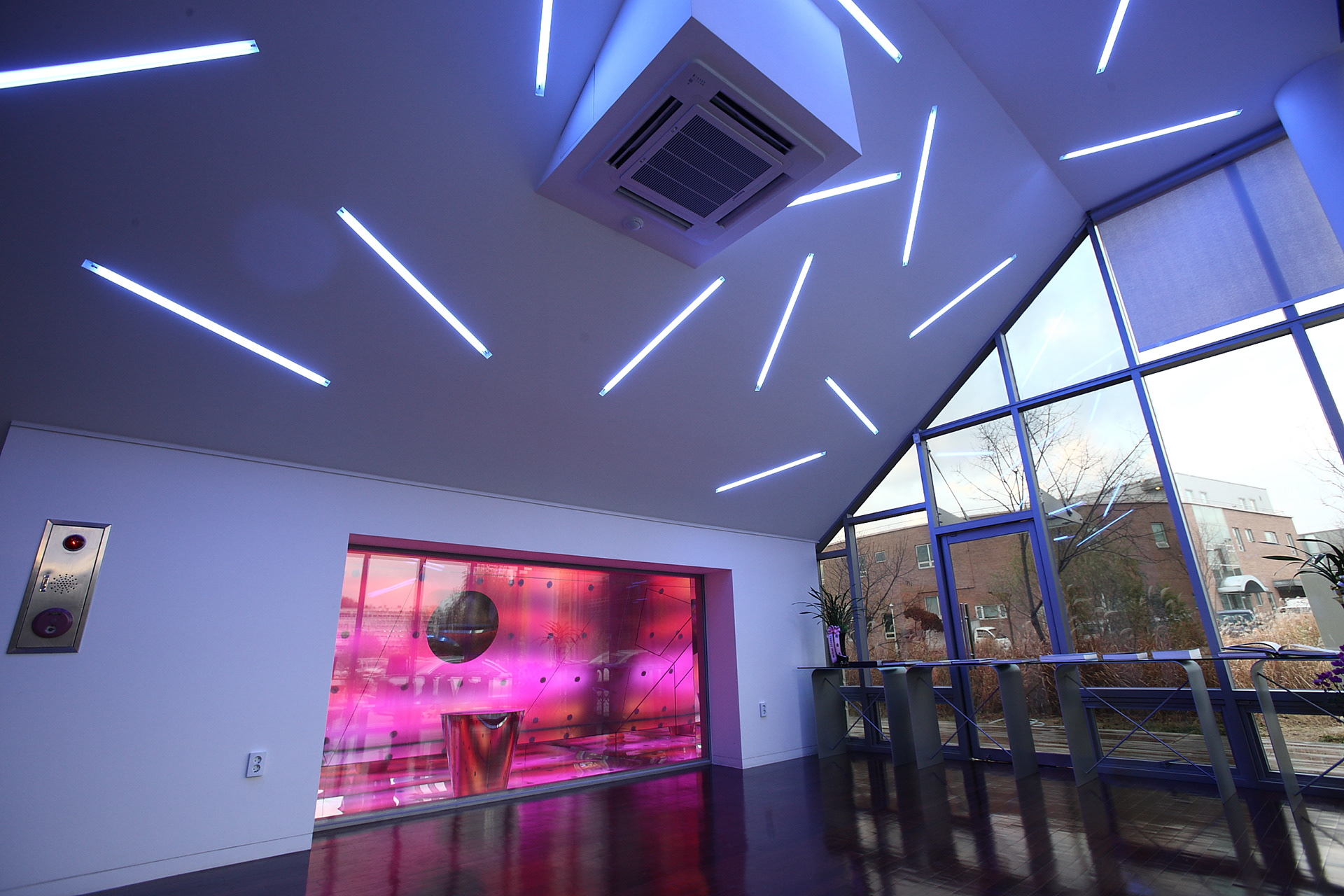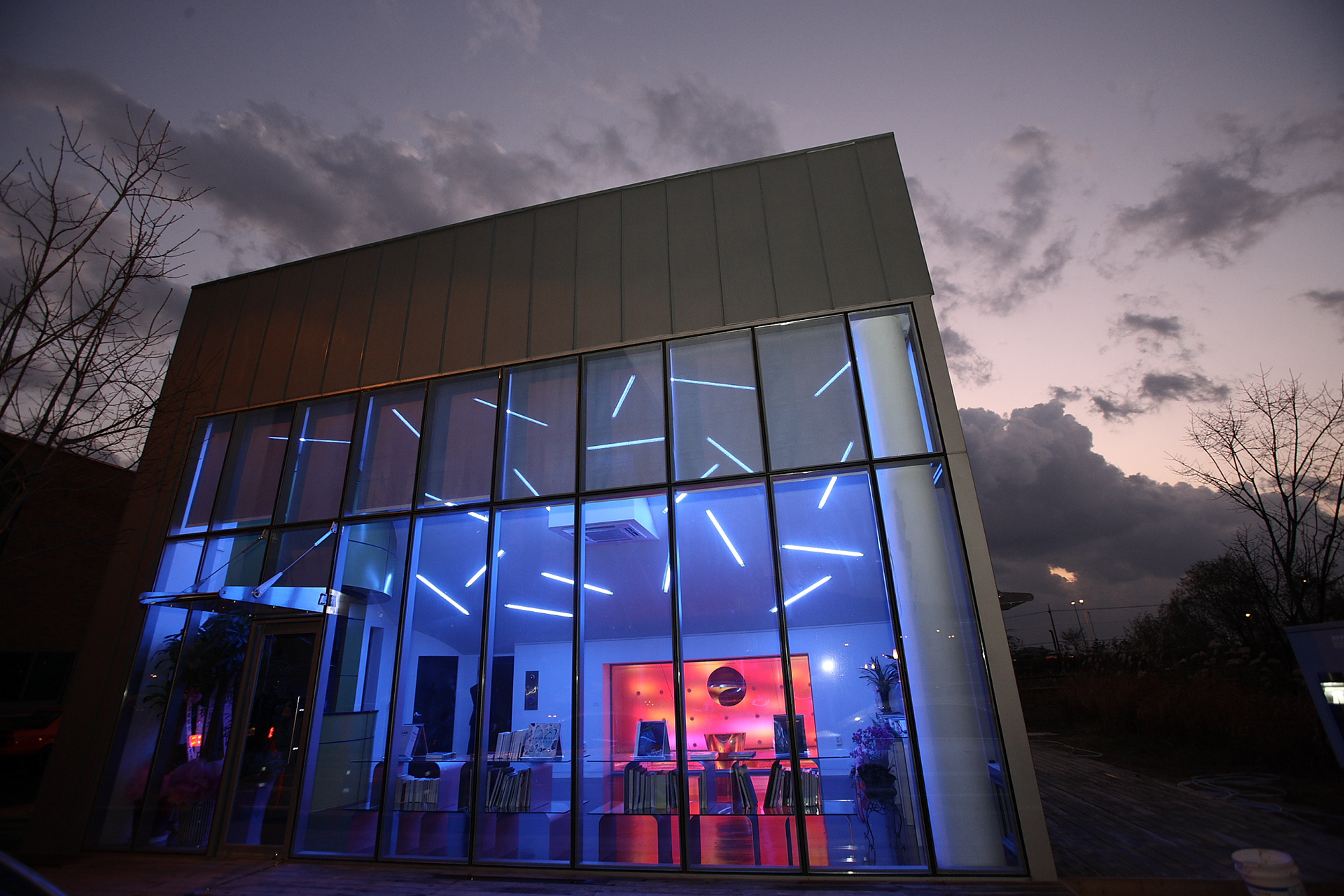by Wonbang Kim (Art Critic, Professor of Hongik University)

Your Stage, 2009. View at Gallery Bakyoung
The basic elements which constitutes the work are 3: light which is flamboyant and oneiric and which associates the stage of shows or theaters; space where endlessly reproduces and expands because of being full of mirrors and a stainless steel object which is installed in the center and is seen as if it is a stage for the performance of lead characters. I believe that those 3 elements could induce the psychological experiences of spectators.
What is to be first mentioned more than anything else is a visualization of dream, fantasy and daydream in a psychoanalysis aspect. The oneiric and unreal space is deviated from the spectator's real space via a large glass window as it is a showcase, which creates the whole work as an individual's imaginary and psychological stage. This is not a space in reality, that is to say, the space which conversations and social relations are performed between a subject and the others but the space of the "fantasy which the subject projects his own desires by himself. Sigmund Freud means the fantasy like a daydream is a "stage in which a subject continues to do his acting with his desires ceased." Particularly, it is a well-known fact that Freud stated that dream, fantasy and daydream are shown through a stage structure and a subject plays a double role of both a lead character who sees his own appearance acting in the stage and a spectator.
By placing a glaring stage(or a table) in the center, Your Stage induces a viewer to perform his/her imaginary acting, that is, the acting of a desire which is a lead character and is also shown as a lead character. This reveals the features of a fantasy which leads to a contradictory situation of "fantasy of for meeting the desires of a subject" and "the impossibility for meeting such desires." Further, it is related to the psychopathology of narcissism which is latent in us all. In the hypnotic space, the work shows that "ego" is a visual and verbal image which a one fabricated imaginarily, that is, an endless cohesion to an imago and the pain of a subject accompanied by narcissism is an inconsistency between the subject's appearance built in such an imaginary way and the real appearance and an agony caused by the revelation of such an inconsistency.
That said, Jinjoon Lee showed an exciting theater performance through his solo exhibition in 2007. In the performance, he explored into the issues such as ego which was constructed in a theatrical way and the fission of an ego. In this context, Your Stage is not just a themepark-like work which intends to give spectators a visual pleasure which a hypnotic light and space creates. The work reveals the issue of impossibility which such a fantastic pleasure bears and the painful gap between real space-the space which linguistic symbolic exchanges with the others are made and fantastic space. Spectators would go through such dialectic and then leave their seats.
What is to be first mentioned more than anything else is a visualization of dream, fantasy and daydream in a psychoanalysis aspect. The oneiric and unreal space is deviated from the spectator's real space via a large glass window as it is a showcase, which creates the whole work as an individual's imaginary and psychological stage. This is not a space in reality, that is to say, the space which conversations and social relations are performed between a subject and the others but the space of the "fantasy which the subject projects his own desires by himself. Sigmund Freud means the fantasy like a daydream is a "stage in which a subject continues to do his acting with his desires ceased." Particularly, it is a well-known fact that Freud stated that dream, fantasy and daydream are shown through a stage structure and a subject plays a double role of both a lead character who sees his own appearance acting in the stage and a spectator.
By placing a glaring stage(or a table) in the center, Your Stage induces a viewer to perform his/her imaginary acting, that is, the acting of a desire which is a lead character and is also shown as a lead character. This reveals the features of a fantasy which leads to a contradictory situation of "fantasy of for meeting the desires of a subject" and "the impossibility for meeting such desires." Further, it is related to the psychopathology of narcissism which is latent in us all. In the hypnotic space, the work shows that "ego" is a visual and verbal image which a one fabricated imaginarily, that is, an endless cohesion to an imago and the pain of a subject accompanied by narcissism is an inconsistency between the subject's appearance built in such an imaginary way and the real appearance and an agony caused by the revelation of such an inconsistency.
That said, Jinjoon Lee showed an exciting theater performance through his solo exhibition in 2007. In the performance, he explored into the issues such as ego which was constructed in a theatrical way and the fission of an ego. In this context, Your Stage is not just a themepark-like work which intends to give spectators a visual pleasure which a hypnotic light and space creates. The work reveals the issue of impossibility which such a fantastic pleasure bears and the painful gap between real space-the space which linguistic symbolic exchanges with the others are made and fantastic space. Spectators would go through such dialectic and then leave their seats.

Your Stage, 2009. View at Gallery Bakyoung
About the author
Wonbang Kim is a critic and curator and served as an artistic director for the 2008 Busan Biennale. His books includes 『Art in the Theater of Cruelty』(1998), 『Mappings of Korean Contemporary Art)』(2009 ) and 『Art in the Age of Electronic Media』(2005), etc. In addition, he contributes to Modern Art and Media Art magazines. Currently he is a professor of art criticism at Hongik University.
